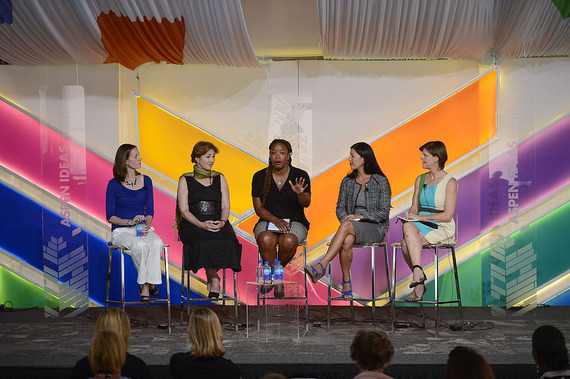*This blog post originally appeared on the Aspen Ideas Festival website.
A recently released major study on women in the workplace shows that the gender gap continues to persist in corporate America, and for some heretofore unexplored reasons. Some of those nuances -- and many other gender issues -- were explored during a comprehensive discussion titled Women and Work at the 2015 Aspen Ideas Festival.
There's good news and bad news about where women are in terms of equality, explained Erin Currier, director of projects on family financial security and mobility for the Pew Charitable Trusts. Today, women earn three times more than their mothers did and are primarily responsible for the upward mobility of their families, she said. On the other hand, women continue to earn less than men and at every rung of the ladder earn less than their fathers did 40 years ago.
"This persistent wage gap and the fact that women are segregated in the workforce creates the perfect storm of holding women back and holding families back," said Currier.
Part of the problem is that women are overwhelmingly working in lower-wage jobs, particularly service jobs, the panel agreed. And while the average income of a professional caregiver is $13,000 per year, these are the jobs of the future because of the country's large aging population, said Ai-jen Poo, director of the National Domestic Workers Alliance.
The online or on-demand economy might be a partial answer to this issue, giving workers, particularly women, the flexibility to work where and how much they need to. But this area needs enforceable standards and protections to ensure the workers can benefit from it, said Poo. And with the United States lagging behind most other countries in policy areas such as sick leave, overtime, family leave, and affordable child care, a lot of work in general needs to be done in terms of public policy, which seems to be ignoring the fact that two-thirds of mothers are going to be their families' primary earners in the near future, Currier pointed out.
"Let's direct our public-policy framework toward the typical worker, and stop living under the illusion that those who typically make policy have the typical American life," said Heather McGhee, president of Demos, a public-policy organization working toward political and economic equality.
But the increasing struggle of balancing working and caregiving is a core issue facing families at all levels of the income ladder in the United States. And it's an area of particular interest for Anne-Marie Slaughter, a former State Department policy-planning director whose recently released book, "Unfinished Business: Women Men Work Family," is an expansion of her widely read 2012 Atlantic cover article, "Why Women Still Can't Have It All."
"My experience as a manager is that for women who are not pushing for the next level up that will get them the bigger job, the bigger raise, compensation comes in time for care and cash, and they want more time for care," said Slaughter, who is currently president and CEO of the New America foundation.
Slaughter argued in another session focused on her book (available through the Aspen Ideas To Go podcast) that while women's liberation was successful at bringing women into the workplace and encouraging their competitive side, not much has been done for their caring side.
"I now believe those two side are equal, that the caring side of us is every bit as important as the competitive side," said Slaughter during her conversation with journalist Hanna Rosin. "And that if we recognize those as equal, then we have a much more inclusive feminism. Then we say to all women that we support the care you give as much as the goals you achieve through your individualism."
Back at the Women and Work session, panelists discussed solutions.
Women who are workplace leaders have a responsibility to change the culture in the organizations they run to account for this shift, said McGhee, who manages 64 people and is also a proponent of collective action.
"Women working at Wal-Mart with two children should be part of the next generation of the women's movement," said McGhee. "When we as women start running Fortune 500 companies, and if we don't address that, we will still be one of the few."
More cultural recognition of the importance of caregiving is needed to elevate it from a low-wage profession, said Poo. And comprehensive immigration reform is needed to get immigrants, who do a lot of the low-wage and service work, out of the shadows.
And finally, much more work is needed with men and boys.
"We've liberated women, but we have not liberated men," said Slaughter. "We are raising our daughters to be anything they want. But our sons are being raised the same: They're raised to think about how much you can earn and how much power you wield. We need to get to a place where being a good man, a strong man, a sexy man includes, 'I'm supporting my wife with care rather than cash.' It's time for men to have a conversation and have a much broader concept of what a good man is."
In this video clip, the panelists say whether they're optimistic or pessimistic about where the issue of women and work is heading. You may be surprised.
Catherine Lutz is a freelance writer.
